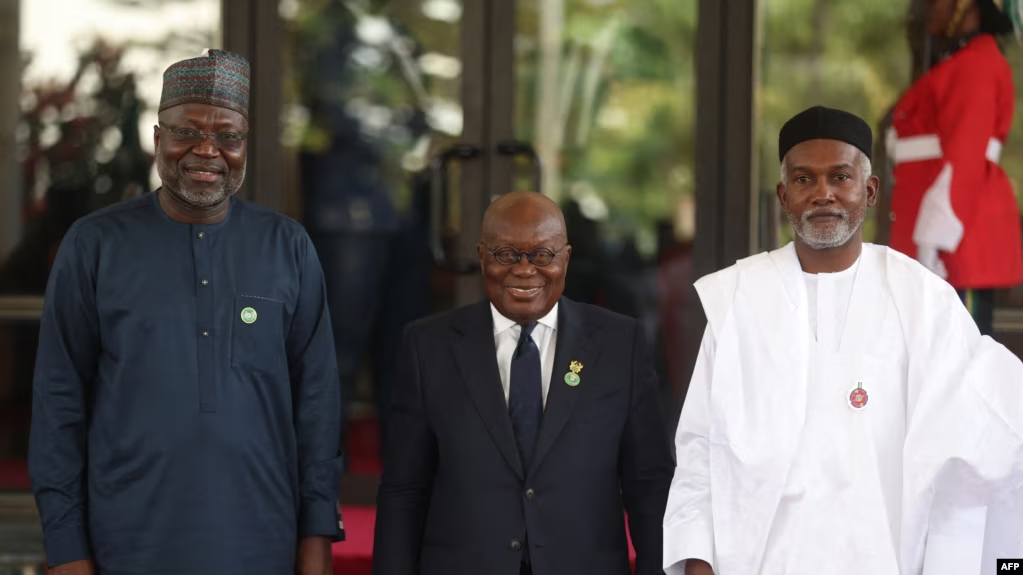ABUJA, NIGERIA —
West Africa’s regional bloc, ECOWAS, met on Sunday to discuss the exit timeline for three coup-hit nations, after nearly a year of mediation aimed at preventing a historic split within the group.
“The authority decides to set the period from 29 January, 2025, to 29 July 2025 as a transitional period and to keep ECOWAS doors open to the three countries during this transition,” stated ECOWAS Commission President Omar Touray.
In an unprecedented move, the military juntas of Niger, Mali, and Burkina Faso announced in January their decision to leave ECOWAS. They criticized the bloc’s “inhumane and irresponsible” sanctions imposed after the coups and claimed that ECOWAS had failed to help them resolve internal security challenges.
The three countries have resisted ECOWAS’ efforts to reverse their decision, and they have begun planning to issue travel documents independently of the bloc. They are also exploring the possibility of forming a new regional alliance. Their formal departure is expected to be completed by January 2025.
ECOWAS Faces Tough Challenges
The potential loss of three member states is a significant blow to ECOWAS, which has worked for nearly 50 years to foster regional unity. At a summit in Abuja, Nigeria, ECOWAS Commission President Touray acknowledged the challenges but praised the bloc’s mediators for their tireless efforts.
“These efforts underscore your collective commitment to preserving peace and unity in our region,” Touray said.
Nigeria’s President Bola Tinubu, who currently chairs ECOWAS, noted the difficulties posed by the global and regional challenges facing the bloc. “We must not lose sight of our fundamental responsibility, which is to protect our citizens and create an enabling environment where they can prosper,” Tinubu stated.
Impact on Free Movement and Regional Relations
One of the key benefits of ECOWAS membership is visa-free travel between member states. However, it remains unclear how this will be affected by the departure of the three nations. In a joint statement, the three countries emphasized that while they would maintain visa-free access for other West African citizens, they reserved the right to deny entry to any ECOWAS national deemed an “inadmissible immigrant.”
This development raises concerns about the potential fragmentation of regional cooperation, a challenge that ECOWAS has never faced in its history. According to Babacar Ndiaye, a senior fellow at the Timbuktu Institute for Peace Studies, the division represents the bloc’s biggest crisis since its formation in 1975.
Slim Chances of Reconciliation
Experts suggest that the chances of ECOWAS bringing the three countries back into the fold are slim. The bloc’s insistence on a swift return to democracy contrasts with the military juntas’ reluctance to commit to democratic reforms.
Mucahid Durmaz, a senior analyst at Verisk Maplecroft, explained that allowing the juntas to remain in power could risk further fragmentation within the region. “Recognizing them as legitimate authorities would represent a serious departure from ECOWAS’s founding principles,” Durmaz added.
The situation has also highlighted ECOWAS’s inconsistent responses to coups in the region. Durmaz pointed out that the bloc’s actions often seem influenced by the political interests of its member states rather than its commitment to promoting democratic governance.
A Critical Moment for ECOWAS
As ECOWAS faces its most serious challenge in decades, its ability to navigate the growing divide and address the concerns of the departing nations will shape the future of the bloc. The next few months will be crucial in determining whether the group can preserve its unity or face lasting fragmentation.
Descubre más desde Polimatía TemisEdu
Suscríbete y recibe las últimas entradas en tu correo electrónico.


